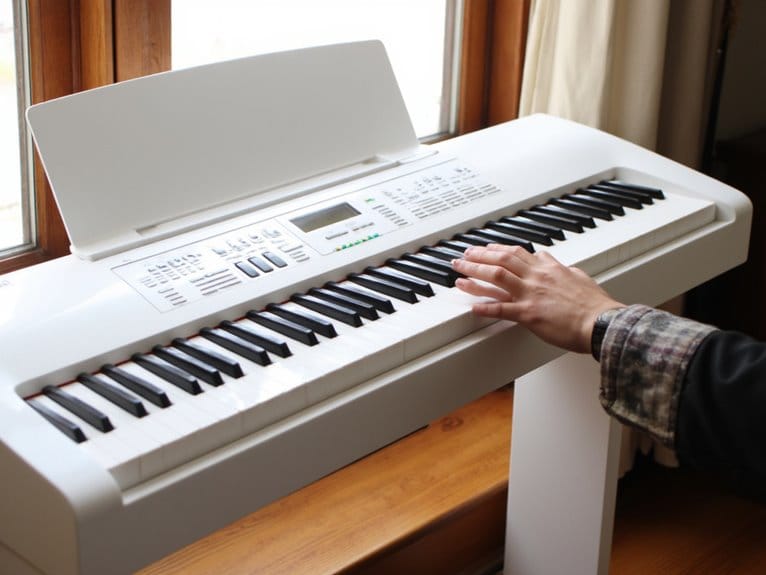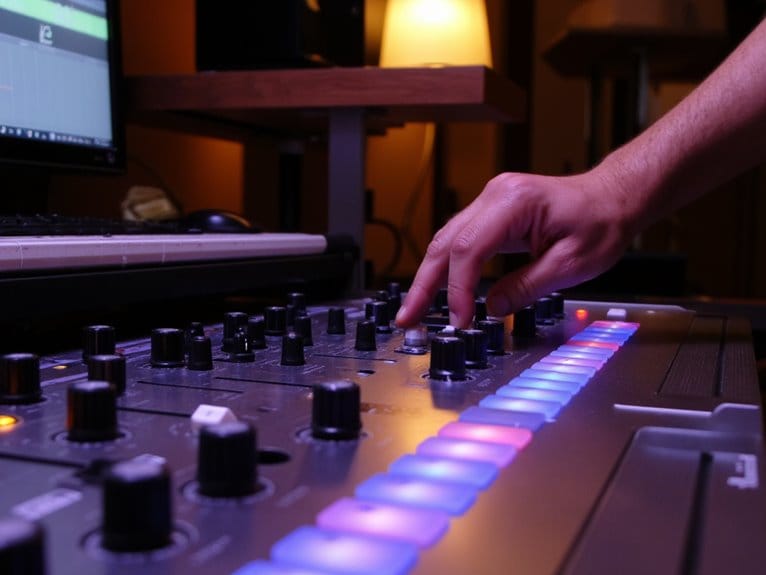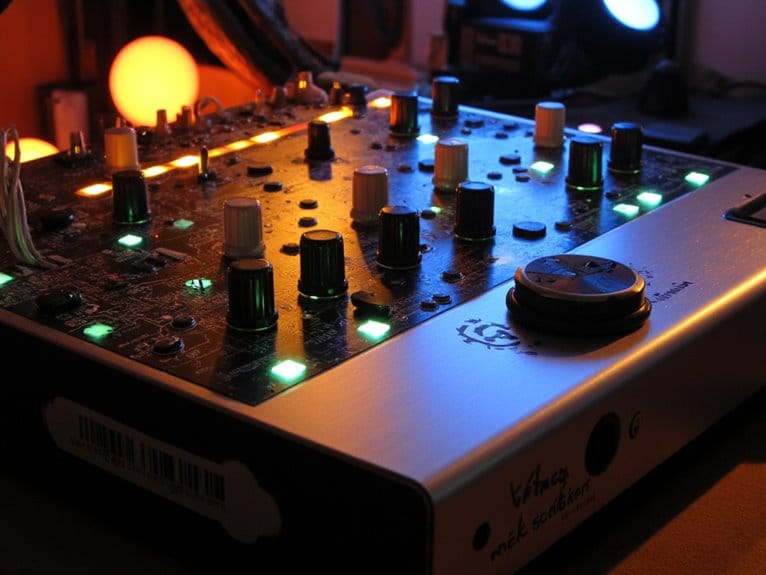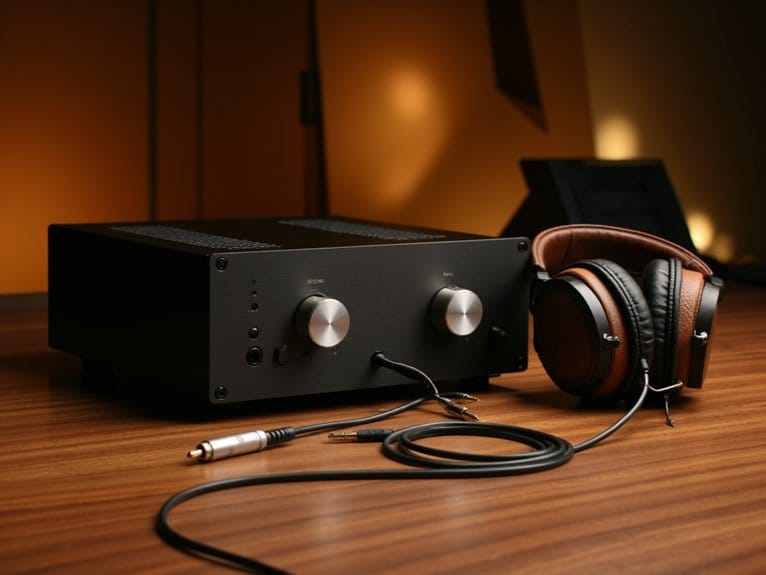Essential Advice for New and Aspiring Music Teachers
You’ll need to complete a teacher preparation program with an undergraduate music degree, then pass certification exams covering general pedagogy and music-specific content assessments. Master music theory fundamentals including scales, intervals, and Roman numeral analysis, while developing performance techniques across multiple instruments to demonstrate concepts effectively. Pursue graduate coursework since many states require master’s degrees for license renewal, and engage in collaborative workshops that integrate theory with practice to enhance your teaching effectiveness and discover advanced strategies.
We are supported by our audience. When you purchase through links on our site, we may earn an affiliate commission, at no extra cost for you. Learn more.
Notable Insights
- Complete a teacher preparation program with a music degree and pass required certification exams before applying for teaching positions.
- Master fundamental music theory, history, and performance skills while developing multisensory teaching methods for diverse learning styles.
- Cultivate strong listening and sight-reading abilities across multiple clefs to effectively demonstrate musical concepts to students instantly.
- Pursue ongoing professional development through graduate coursework, workshops, and networking to maintain teaching effectiveness and meet renewal requirements.
- Build community engagement initiatives and participate in professional learning teams to enhance program sustainability and prevent burnout.
Where do you even begin when you’re ready to transform your passion for music into a teaching career?
I’ll be honest, the certification maze initially overwhelmed me, but breaking it down makes everything manageable. You’ll need to complete a teacher preparation program, typically requiring an undergraduate music degree with specific coursework in pedagogy, theory, and performance techniques.
The certification exams come next—most states require both general pedagogy tests and music-specific content assessments, like Texas’s TExES series with their standardized 240 passing score threshold.
The application process involves submitting transcripts, exam results, and completing background checks through fingerprinting requirements. You’ll also need approval from your educator preparation program before you can even register for exams.
Don’t forget about renewal obligations either, since most certificates expire every five years, requiring continuing education hours to maintain your teaching credentials. Many programs also require classroom training experiences where you’ll work directly with students under supervision to develop practical teaching skills.
Building a Strong Foundation in Music Theory, History, and Performance
Mastery of music’s fundamental building blocks—theory, history, and performance—forms the bedrock upon which effective teaching rests. I’ve learned that skipping these essentials creates shaky ground for everything that follows. Your students will quickly expose any gaps in your understanding when they ask why certain chords create tension or how Baroque ornamentation differs from Romantic expression.
Strong theory basics encompass scales, intervals, triads, and Roman numeral analysis, while historical influences provide context for stylistic interpretation. Performance techniques on keyboard, voice, or guitar enable you to demonstrate concepts effectively, and multisensory teaching methods address diverse learning styles. Developing proficiency in rhythmic notation ensures you can accurately transcribe and teach the groove elements that make contemporary music compelling. Teachers who cultivate listening comprehension skills can better guide students in recognizing subtle musical nuances and structural patterns. Quality audio interfaces with proper gain capabilities become essential when recording student performances or creating demonstration materials for your lessons. Budget-friendly options with phantom power capabilities can support condenser microphones for capturing detailed vocal or acoustic instrument recordings in your teaching studio.
Solid theoretical foundations and diverse performance skills create the versatile toolkit every music educator needs for effective classroom instruction.
- Master sight-reading in multiple clefs to instantly demonstrate musical examples
- Study diverse composers from various cultural backgrounds for inclusive curriculum development
- Practice daily to maintain your own musicianship standards
- Analyze popular songs to connect theory with students’ musical interests
Advancing Your Career and Professional Development
Although I’ve witnessed countless talented music teachers plateau in their careers due to stagnant professional development, I’ve also seen how strategic growth opportunities can transform both teaching effectiveness and long-term career satisfaction.
You’ll want to pursue graduate coursework early, as many states require master’s degrees for license renewal, and online programs offer flexibility to balance your demanding schedule.
Seek out collaborative workshops that integrate theory with practice, since these experiences bridge the gap between academic training and classroom realities.
Don’t underestimate networking opportunities at conferences and seminars, where sharing experiences with colleagues encourages innovation and collective problem-solving.
Regular participation in professional learning teams combats burnout while increasing student achievement through enhanced instructional methods. Building community engagement initiatives that link your music program with local entities can significantly enhance program success and sustainability. Research consistently shows that limited access to quality professional development resources remains a significant barrier for music educators seeking to advance their skills.
On a final note
You’ve got the roadmap now—certification requirements that’ll open classroom doors, foundational knowledge that’ll make you credible, and career strategies that’ll keep you growing. I won’t sugarcoat it: teaching music isn’t always harmonious, but when you’re prepared with proper credentials, solid musical expertise, and a commitment to lifelong learning, you’ll navigate the challenges successfully. Trust the process, embrace the journey, and remember that every master teacher started exactly where you’re standing today.







